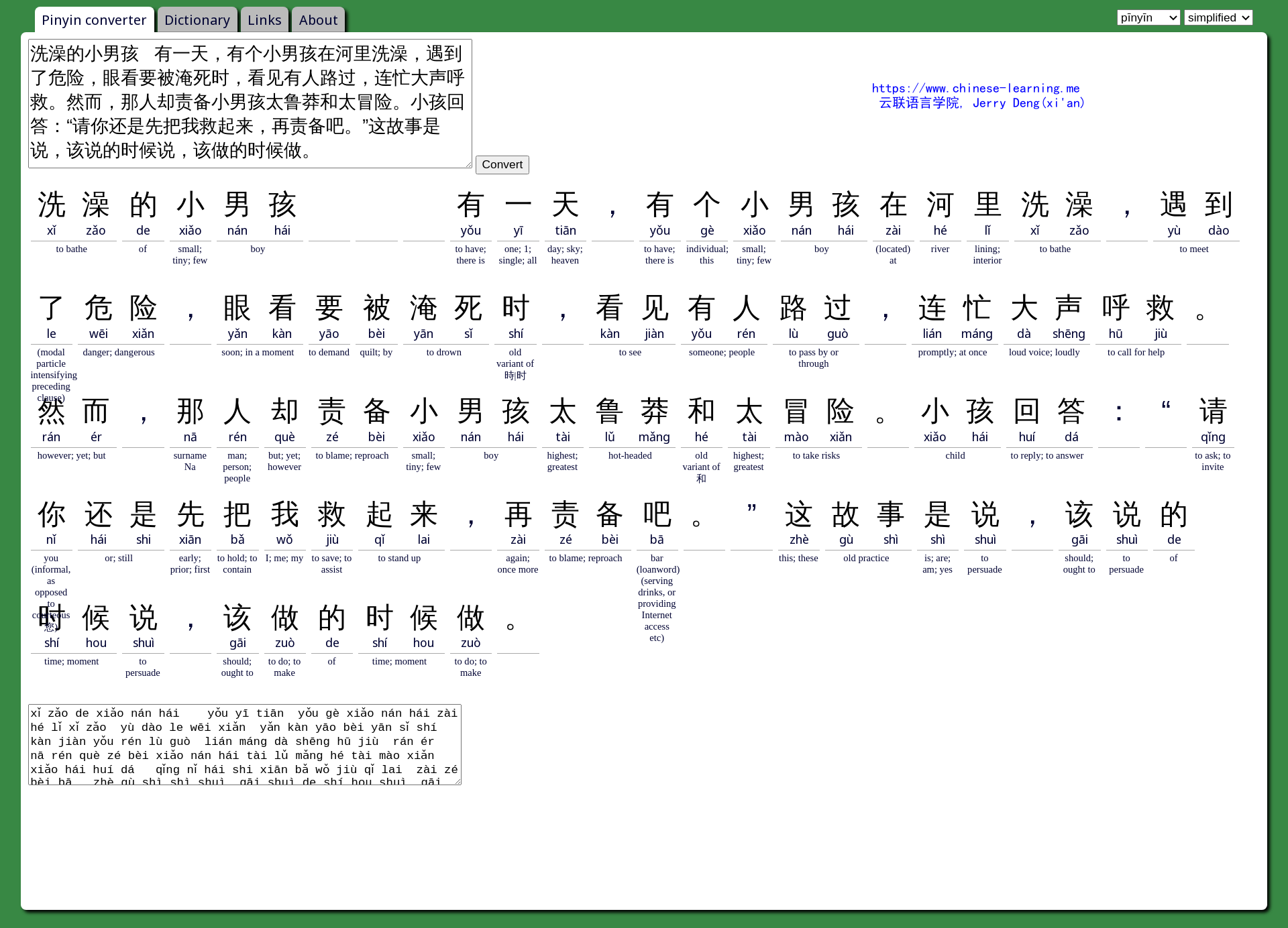
Show Pīnyīn
有一天,有个小男孩在河里洗澡,遇到了危险,眼看要被淹死时,看见有人路过,连忙大声呼救。然而,那人却责备小男孩太鲁莽和太冒险。小孩回答:“请你还是先把我救起来,再责备吧。”
这故事是说,该说的时候说,该做的时候做。
yǒu yītiān , yǒugè xiǎonánhái zài hélǐ xǐzǎo , yùdào le wēixiǎn , yǎnkàn yào bèi yānsǐ shí , kànjiàn yǒurén lùguò , liánmáng dàshēng hūjiù 。 ránér , nàrén què zébèi xiǎonánhái tài lǔmǎng hé tài màoxiǎn 。 xiǎohái huídá : “ qǐng nǐ háishi xiān bǎ wǒ jiù qǐlai , zài zébèi bā 。 ”
zhè gùshi shì shuō , gāi shuō de shíhou shuō , gāi zuò de shíhou zuò 。

One day, a little boy was bathing in the river and was in danger. When he was about to drown, he saw someone passing by and shouted for help. However, the man accused the little boy of being too reckless and too adventurous. The child replied: "Please save me first, and then blame me."
This story is about saying, saying when it should be said, and doing it when it should be done.
Un día, un niño pequeño se estaba bañando en el río, cuando estaba en peligro y estaba a punto de ahogarse, vio que alguien pasaba y gritó pidiendo ayuda. Sin embargo, el hombre acusó al niño de ser demasiado imprudente y demasiado aventurero. El niño respondió: "Por favor, sálvame primero y luego cúlpame".
Esta historia trata de decir, decir cuando se debe decir y hacer cuando se debe hacer.
Un jour, un petit garçon se baignait dans la rivière, alors qu'il était en danger et qu'il était sur le point de se noyer, il a vu passer quelqu'un et a crié à l'aide. Cependant, l'homme a accusé le petit garçon d'être trop téméraire et trop aventureux. L'enfant a répondu: "S'il vous plaît, sauvez-moi d'abord, puis blâmez-moi."
Cette histoire parle de dire, de dire quand il faut le dire et de le faire quand il faut le faire.
ある日、川で水浴びをしていた小さな男の子が、危うく溺れそうになったとき、誰かが通りかかるのを見て大声で助けを求めました。しかし、男は少年が無謀すぎて冒険好きすぎると非難した.その子は、「まず私を助けて、それから私を責めてください」と答えました。
この物語は、言うこと、言うべきときに言い、するべきときにそれをすることについてです。
Eines Tages badete ein kleiner Junge im Fluss und als er in Gefahr war zu ertrinken, sah er jemanden vorbeikommen und rief um Hilfe. Der Mann warf dem kleinen Jungen jedoch vor, zu leichtsinnig und zu abenteuerlustig zu sein. Das Kind antwortete: "Bitte rette mich zuerst und beschuldige mich dann."
In dieser Geschichte geht es darum, zu sagen, zu sagen, wann es gesagt werden sollte, und es zu tun, wenn es getan werden sollte.